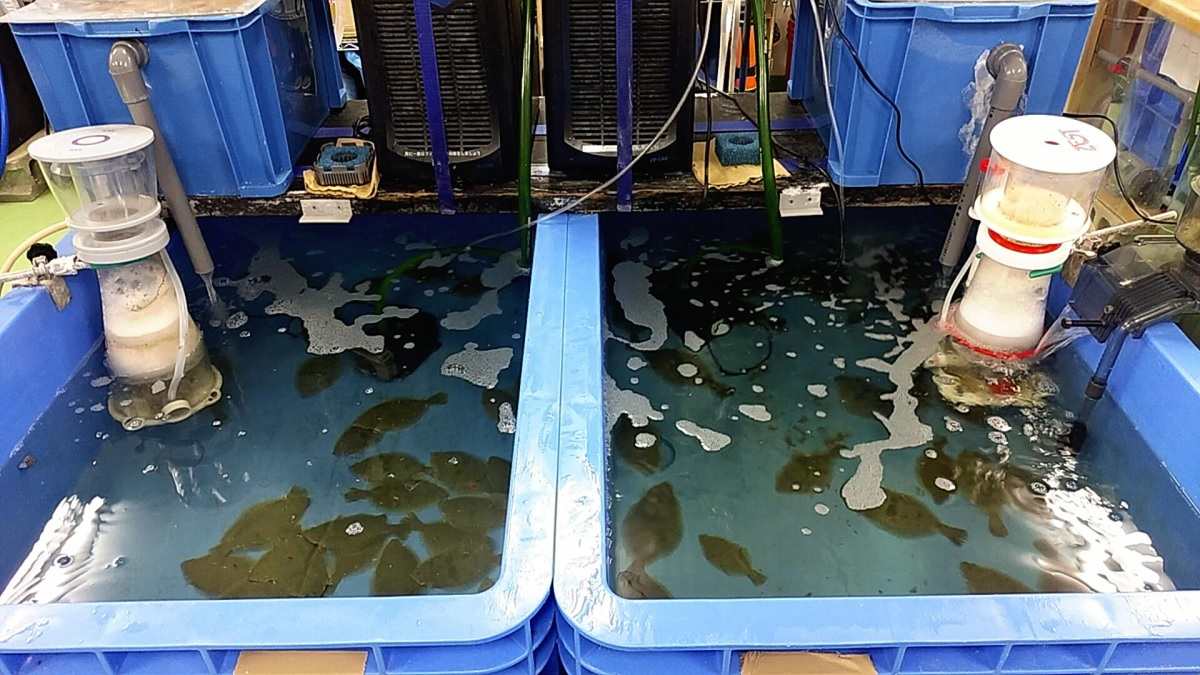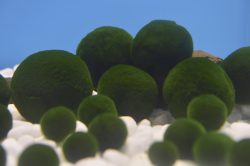
Flatfish are raised in seawater containing deuterium at the Institute for Environmental Sciences.
14:07 JST, October 5, 2023
A team of researchers has confirmed through experiments that deuterium (an isotope of hydrogen) does not accumulate in the bodies of flatfish, indicating that tritium, whose chemical properties are almost the same as deuterium, will not accumulate in fish either.
Tritium, a radioactive substance, is contained in treated water released from the Fukushima No. 1 nuclear power plant of Tokyo Electric Power Company Holdings, Inc.
In an experiment, deputy chief researcher Takashi Tani and researcher Yoshio Ishikawa of the Institute for Environmental Sciences in Rokkasho, Aomori Prefecture, raised flatfish in seawater with a 0.2% deuterium concentration. They found that although the deuterium concentration in the muscles of the flatfish gradually increased, it leveled off at 0.04% about 160 days later.
The deuterium concentration decreased after the fish were placed in normal seawater and returned to normal levels about 200 days later, showing that deuterium does not accumulate in the muscles of the fish.
In a simulation of the effects of the treated water, based on the results of the experiment, the researchers calculated the exposure dose of people who ate flatfish raised in seawater with a tritium concentration of 1,500 becquerels per liter on a daily basis. The concentration was in line with the discharge standard.
The researchers found the annual exposure dose was 0.0019 millisieverts, less than one-thousandth of the radiation levels found in the natural environment.
The institute has been studying the effects of wastewater containing radioactive materials on seawater and fish in preparation for the start of the operation of Japan Nuclear Fuel Ltd.’s spent nuclear fuel reprocessing plant which is being constructed in Aomori Prefecture.
The latest research results were published in an international journal on environmental science.
“There was no significant difference between deuterium and tritium under the conditions of the latest experiment. Since it was confirmed that deuterium does not accumulate [in the bodies of fish], we can estimate that tritium will not accumulate either,” said Yuji Torikai, professor of radiation chemistry at Ibaraki University.
Top Articles in Science & Nature
-

Japan Institute to Use Domestic Commercial Optical Lattice Clock to Set Japan Standard Time
-

Japan to Face Shortfall of 3.39 Million Workers in AI, Robotics in 2040; Clerical Workers Seen to Be in Surplus
-

Record 700 Startups to Gather at SusHi Tech Tokyo in April; Event Will Center on Themes Like Artificial Intelligence and Robotics
-

iPS Treatments Pass Key Milestone, but Broader Applications Far from Guaranteed
-

iPS Cell Products for Parkinson’s, Heart Disease OK’d for Commercialization by Japan Health Ministry Panel
JN ACCESS RANKING
-

Japan PM Takaichi’s Cabinet Resigns en Masse
-

Japan Institute to Use Domestic Commercial Optical Lattice Clock to Set Japan Standard Time
-

Israeli Ambassador to Japan Speaks about Japan’s Role in the Reconstruction of Gaza
-

Man Infected with Measles Reportedly Dined at Restaurant in Tokyo Station
-

Videos Plagiarized, Reposted with False Subtitles Claiming ‘Ryukyu Belongs to China’; Anti-China False Information Also Posted in Japan
























